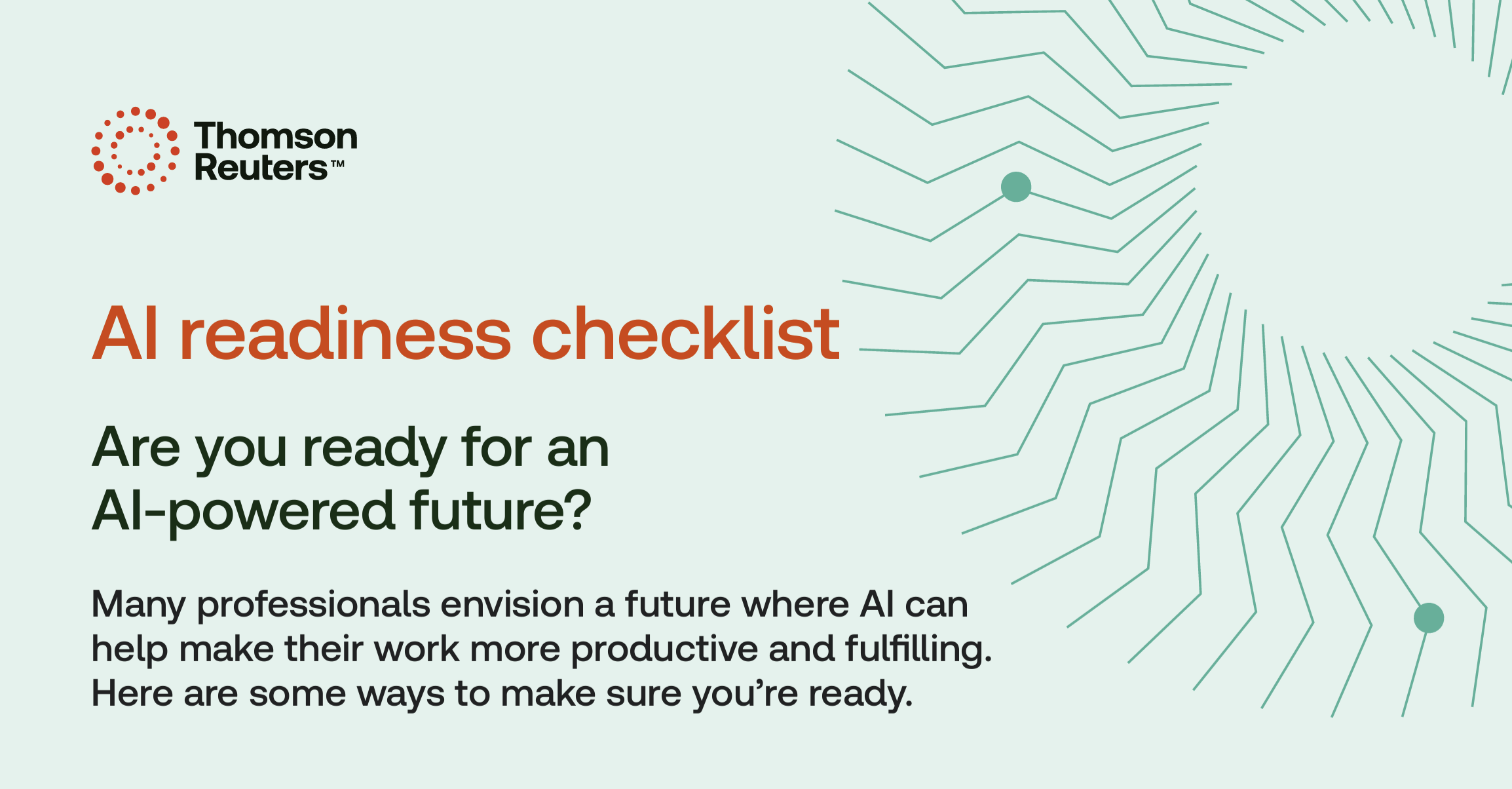Ongoing survey of professionals reveals the impact of legal work, clients, concerns, and future roles
Highlights
- 80% of respondents believe AI will have a high or transformational impact on their work within the next five years. That’s an increase of 3 percentage points over the 2024 report’s responses. ¹
- 72% of legal professionals surveyed in the report view AI as a force for good in their profession. ²
- 53% of respondents said their organizations are already seeing a return on investment (ROI) from investing in AI. ³
Over the past few years, legal professionals have become less wary of artificial intelligence (AI). Indeed, they are increasingly embracing AI as a transformative force, becoming more and more optimistic about the positive impact it can have on their practices.
Jump to ↓
| Impact on legal work |
| Impact on clients |
| Impact on concerns |
| Impact on future roles |

2025 Future of Professionals Report
Survey of 2,275 professionals and C-level corporate executives from over 50 countries
View report ↗What is the impact of AI on legal work?
According to the professionals surveyed in 2025 Thomson Reuters’ Future of Professionals Report:
- AI is driving productivity of routine legal tasks, including document review, legal research, and contract analysis.
- These tools have the potential to save lawyers nearly 240 hours per year.
The report surveyed 2,275 professionals in a number of fields: legal, tax, accounting, global trade, risk, fraud and compliance, and corporate C-suite. Most respondents were legal professionals. 4
Responses came from around the globe: the United States, Australia, New Zealand, the United Kingdom, Canada, Latin America, Mainland Europe, Asia, Africa, and the Middle East.
Size of law firm (total employees)
| Up to 100 | 58% |
| 101-1000 | 27% |
| 1001+ | 16% |
Source: 2025 Future of Professionals Report
As they look ahead, it’s clear that legal professionals need to stay on top of new AI developments and terminology like agentic AI and generative AI (GenAI) for legal tasks, clients, concerns, legal frameworks, and future roles.
Thomson Reuters continues to take the pulse of the changes in the legal profession, tracking the data on AI and law, and issuing new annual reports on its research.
AI is no longer theoretical in the legal field—it’s already being used in a wide range of day-to-day tasks. The benefits are significant, with the potential to transform the way legal professionals deliver value and service to clients.
Among legal professionals currently using AI tools: 5
- 77% use it for document review
- 74% use it for legal research
- 74% use it to summarize documents
- 59% use it to draft briefs or memos
These figures show that AI is becoming a trusted partner in core legal workflows — not just back-office efficiency.
Top legal and government GenAI use cases
|
|
| Document review | 77% 64% |
| Legal research | 74% 69% |
| Document summarization | 74% 67% |
| Brief or memo drafting | 59% 58% |
| Contract drafting | 58% 32% |
| Correspondence drafting | 50% 51% |
| Knowledge management | 47% 54% |
| Extracting contract data | 50% 26% |
| Question answering service | 37% 32% |
| Marketing | 35% 11% |
| Business development | 34% 10% |
| Preparing deposition questions | 26% 19% |
| Contract policy compliance | 24% 21% |
| Risk assessment and reporting | 22% 26% |
| Human resources | 17% 22% |
| Finance | 13% 15% |
| ESG and reporting | 8% 8% |
Source: 2025 Generative AI in Professional Services Report
Demands due diligence
With adoption on the rise, legal professionals need to approach AI implementation with care. Due diligence is essential. Without thoughtful and rigorous evaluation, firms risk falling short of AI’s full potential—or introducing errors that could compromise their work.
Unlocks efficiency
One of the most compelling benefits of AI is time savings. AI-powered tools can accelerate repetitive yet necessary tasks that often consume significant portions of a lawyer’s day.
For example, drafting standard contracts — a process traditionally involving tedious cutting, pasting, deleting, and editing — can now be handled more quickly and accurately with AI assistance.
These tools can also support legal professionals in conducting faster research, reviewing precedents, and summarizing source material across platforms.
Highlights trust and transparency
Of course, speed alone isn’t enough. Legal professionals must ensure the AI tools they use are built to meet the highest standards of accuracy, precision, and credibility. That means selecting tools that:
- Draw from reliable, expert-maintained legal sources
- Are transparent about how they generate outputs
- Enable the creation of precise, enforceable documents tailored to jurisdictional needs
Only with this level of quality can AI truly support the rigor that legal work demands.
From time savings to strategic value
The 2025 Future of Professionals Report predicted that AI could free up approximately 240 hours per year per legal professional.
But the implications go far beyond efficiency.
As workflows become more streamlined, 43% of legal professionals anticipate a decline in hourly billing models over the next five years. This shift opens the door for legal professionals to reinvest their reclaimed time in more meaningful and strategic pursuits — whether that means:
- Focusing on physical and mental well-being
- Deepening client relationships
- Engaging in firm-wide strategic planning
- Delivering insightful, high-value guidance
In short, AI isn’t just about working faster — it’s about working smarter, and with greater purpose. By automating the repetitive, it gives legal professionals more time to do the work that truly matters.

CoCounsel Legal
Work smarter with CoCounsel, seamlessly integrated with Westlaw, Practical Law, Microsoft 365, and DMS partners
Go professional-grade AI ↗What is the impact of AI on clients?
AI has been transforming how legal services deliver value to their clients, and it continues to do so. This, in turn, will require legal professionals to make changes to their traditional business models.
A 2024 report on the legal sector client relationships from the Thomson Reuters Institute notes that technological advancements and shifting demographics are pushing law firms to adapt to evolving client demands.
Of the legal professionals surveyed in the 2024 Future of Professionals Report, 42% want to spend more of their valuable time on expertise-driven legal work in the next five years.
Which of the following changes would you most like to see in your profession in the future?
| Improved work-life balance | 59% |
| More time spent on engaging, judgment-based or expertise-driven work | 42% |
| Improved mental health & wellbeing | 38% |
| More innovation and willingness to embrace change | 35% |
| Greater opportunity for continual skill-building | 29% |
| Improved access to/affordability of legal justice or tax advice for under-served groups | 20% |
| Greater variety and/or accessibility of career paths | 19% |
| More collaborative culture | 18% |
| Improved Diversity, Equity and Inclusion | 12% |
Source: 2024 Future of Professionals Report
Respondents identified several key value areas where they are most excited about the use cases of AI-powered technologies:
- Handling large volumes of legal data more effectively – of which 59% of respondents cited as an area where AI can help deliver greater value
- Improving client response times — 41%
- Reducing human error — 35%
- Providing advanced analytics for decision-making — 3%
In other words, professionals are looking to AI as a means of providing more services to their clients that can boost those clients’ success and that of the businesses.
“The role of a good lawyer is as a ‘trusted advisor,’ not as a producer of documents . . . breadth of experience is where a lawyer’s true value lies and that will remain valuable.”
2024 Future of Professionals Report
Clients, after all, are facing changes and challenges of their own. They’re often under pressure to lower expenses and to get responses to their legal needs and queries as quickly as possible.
AI can help legal professionals deliver services that address these challenges. AI-powered tools can analyze past client interactions, preferences, and behavioral patterns to generate highly personalized next-best actions for each client relationship. In this regard, legal professionals can use AI to:
- Streamline routine legal tasks, thus freeing up time for higher-value client interactions
- Provide predictive insights into potential case outcomes, which can enhance client counseling
- Offer real-time language translation, which can facilitate global client communication
- Generate customized reports and updates, thus improving transparency and engagement between lawyer and client
All this noted, only 54% of respondents felt confident articulating AI’s value proposition to clients beyond greater efficiency. Legal professionals still have worries about this technology, despite generally being more open to it.
Lawyers will need to demonstrate to clients that their services are still worth paying top dollar for, even with AI providing more of those services. Clients are becoming more AI-literate, and they increasingly want reassurance that the tools being used:
- Are secure and ethical
- Don’t replace human judgment
- Still result in high-value, tailored advice
What are the concerns?
As the 2025 report notes, one of the biggest issues regarding AI-powered technologies is its ethical use. Respondents believe that AI still requires significant human oversight as well as clearly drawn boundaries regarding its use.
Among those professionals who’ve yet to work with an AI tool:
- 50% expressed concerns about the quality and usefulness of the output, and
- 13% have worries about data security implications.
Whether or not they’re experienced with AI, nearly all respondents express the need for human oversight of its output as well as rules developed in-house to regulate its use and where it should be applied.
Many respondents in the 2024 report also believed in establishing industry-wide codes of ethics and even certification.
In any case, legal professionals certainly believe in the need for boundaries:
- 96% of legal professionals believe allowing AI to represent clients in court would be “a step too far,”
- 83% consider using AI to provide legal advice would also constitute an inappropriate use case of the technology.
There also appears to be a general consensus that lawyers should rigorously oversee the output of their AI tools to ensure compliance with professional ethical standards.
While AI will continue to advance, professionals’ concerns about its use won’t disappear. But those concerns should help push AI tools to become even better.
Legal professionals have a shared belief in the need for human oversight of AI and clearly defined ethical boundaries, which will likely influence the actions of both individual lawyers and rule-making bodies, including legislatures and state bars.

White paper
The pitfalls of consumer-grade tech and the power of professional AI-powered solutions for law firms
View white paper ↗Sentiment and readiness among legal professionals
Legal professionals feel increasingly positive about using AI in the workplace. 6
Survey results show that:
- 28% felt hopeful
- 27% felt excited
- 24% felt hesitant
- 15% felt concerned
- 2% felt fearful
That’s an 11-percentage point increase from the prior year in the number of people who felt excited or hopeful, and an 11% drop in the number who felt hesitant.
What’s driving — and delaying — AI adoption in law
54% percent of respondents said that saving time excited them the most about using AI. 7
39% percent cited increased quality and value, which included being able to handle large volumes of data more effectively, reducing inaccuracies from human error, and accessing advanced analytics for better decision-making.
However, barriers still remain. More than one in three respondents have not yet tried using AI-powered technologies at work — not even as a starting point.
The most common reasons included: 8
- Concern about accuracy of outputs – 43%
- Concern about data security – 37%
- Unsure about what type of work the technologies could be used for – 35%
- Unsure about how to access – 28%
- Concern about the ethics of use – 27%
Together, these insights show that while the legal industry is increasingly aware of AI’s potential, real adoption hinges on building trust—trust in the tools, their outputs, and the ethical frameworks guiding their use.
To move from curiosity to confidence, legal professionals will need not just access to AI, but clarity, training, and reassurance that these technologies can enhance, rather than compromise, their work.
A checklist to ensure you are ready for a future powered by AI
Related infographic
What is the impact on future roles?
Speaking of concerns: Professionals of all kinds have worried that this technology would eliminate thousands, even millions, of positions. But in many skilled professions including the legal field, it now appears more likely that AI will transform rather than eliminate jobs.
This is certainly the perception of the majority of those surveyed in the 2024 Future of Professionals Report. All told, 85% of respondents believe that the incorporation of AI into their practices will require taking on new roles and learning new skills.
Respondents foresee increasing demand for the following capabilities:
- Ability to adapt to change – 71% increase
- Problem-solving — 56% increase
- Creativity – 53% increase
- Communication skills — 52% increase
Lawyers need to think about enhancing these capabilities for themselves and their team members. They also need to look beyond the direct impact of AI on the tools they use and consider the bigger picture of how their roles may be changing.
What new value can they bring to their clients? How will they use the time that they save? Will they need to meet new expectations about productivity? Will legal education be different? Will AI skills affect hiring? Will the structure of law firms and organizations change? What new roles may become available?
Here are the top emerging roles that respondents identified:
- AI-specialist professionals — 39%
- IT and cybersecurity specialists — 37% and 35%
- AI implementation managers — 33%
- AI-specialist trainers — 32%
AI will create new challenges for the legal profession, but also professionally satisfying opportunities.
Agentic AI’s role
Professional-grade agentic AI, powered by large language reasoning models, can make decisions and complete legal workflows by breaking down complex tasks, executing subtasks, and evaluating progress.
Unlike basic chatbots, agentic AI can integrate across tools and platforms. For example, it can sift through case law and use its findings to draft documents.
However, agentic AI still augments rather than replaces legal professionals, as human oversight remains crucial. The right kind of agentic AI solution for legal professionals will escalate important decision-making to humans, and make it easy to audit and revise its work. Already in use by several large law firms, agentic AI is creating internal efficiencies and client-facing work product, positioning early adopters ahead of the curve.
New job role or title expectations due to GenAI within the next 3-5 years
|
|
|
|
|
| Yes | 36% 34% 31% 51% 44% |
| No | 64% 66% 69% 49% 56% |
Source: 2024 Future of Professionals Report
What’s next?
The future of legal practice has never looked brighter.
However, the impact of AI is only the beginning. There are different ways in which law firms and attorneys will be using AI in the coming years—and the skills they’ll need to acquire.

CoCounsel Legal
Workflows, skills, and expert-written prompts to help you immediately get to work
Start working smarter ↗The legal profession is changing faster than ever before, and lawyers need to stay informed and up-to-date. Thomson Reuters leads the way in tracking the evolution of AI and law.
Explore more insights and case studies on how artificial intelligence affects your practice, now and in the future.
1 2025 Future of Professionals Report, p. 7
2 2024 Future of Professionals Report, p. 11
3 2025 Future of Professionals Report, p. 8
4 2025 Future of Professionals Report, page 30
5 2025 Generative AI in Professional Services Report, page 15
6 2025 Generative AI in Professional Services Report, page 4
7 2024 Future of Professionals Report, page 21
8 2024 Future of Professionals Report, page 12











